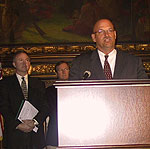Ventura proposes $16 million in four-year anti-terrorism plan
By Laura McCallum
Minnesota Public Radio
January 31, 2002
|
| RealAudio |
Gov. Jesse Ventura has outlined an anti-terrorism package that is less expensive than House and Senate proposals. Ventura says the plan spends what's necessary to protect the public from terrorist threats.
| |
|
|
|
||
Ventura's plan costs less than $7 million this biennium, and another $10 million in the next two-year budget cycle. Half the money would go to the health department for bioterrorism planning, training and equipment. The plan also funds increased Capitol security and weapons training for bomb squads and hazardous materials teams.
The governor says the state's massive $2 billion deficit played no role in the amount of spending he's recommending.
"We are spending what we feel is adequate, because to me, public safety and the safety of the people of Minnesota - I don't think you can argue - is a definite role for government. That's one of our jobs that I don't think you could sit in a room and debate. And so we will spend whatever is necessary and I think the public will understand that," Ventura said.
Legislative leaders want to spend even more. DFL Senate Assistant Majority Leader John Hottinger of Mankato says plans in both the House and Senate are more aggressive than Ventura's.
"I think you're seeing increasing cooperation between the House and the Senate because the governor's proposals here and elsewhere aren't doing the job that Minnesotans need to have done," he said.
The House and Senate proposals spend around $25 million, most of it in the first year. The plans fund enhanced training, equipment and communications for law enforcement who would respond to a terrorist attack.
Ventura says that funding could come from the federal government, which has already pledged $13 million to Minnesota.
|
"Hundreds of people who expect their conversations to be private will be overheard, even though the government can show probable cause for just one single individual."
- Privacy advocate Richard Neumeister |
Republican House Speaker Steve Sviggum of Kenyon says the state may not want to wait for the money. "We certainly want to utilize every federal dollar we can get and I think that's an appropriate federal response, but I've also heard we won't know exactly what those dollars are or obtain those dollars for 18 months. And there are a number of people who think that the preparation for response should not wait 18 months, so that Minnesota's prepared," Sviggum said.
Sviggum says terrorism preparedness is the one area where Republicans are willing to spend more, even in tough budget times. Aside from differences over the level of spending in Ventura's plan, his package will also spark debate over the policy changes. It would update the state's quarantine laws, toughen penalties for terrorist acts and expand wiretapping authority.
Privacy advocate Richard Neumeister is concerned about lowering the threshold to obtain a roving wiretap. That allows law enforcement to track all communication connected to an individual, rather than just a specific phone number.
Neumeister told a House committee earlier this week that a roving wiretap allows the government to intercept all of the conversations in a room. "Hundreds of people who expect their conversations to be private will be overheard, even though the government can show probable cause for just one single individual," he said.
Neumeister cautions lawmakers not to rush to pass something that infringes on civil liberties. Gov. Ventura argues his plan doesn't.
"I wanted to make sure that what we did wasn't a wholesale crushing of people's civil rights. That isn't what America's about. We're about freedom," he said.
Ventura is urging quick action on anti-terrorism legislation. He says Minnesotans need to remember that the nation is at war, and could be attacked again at any time.
More from MPR
